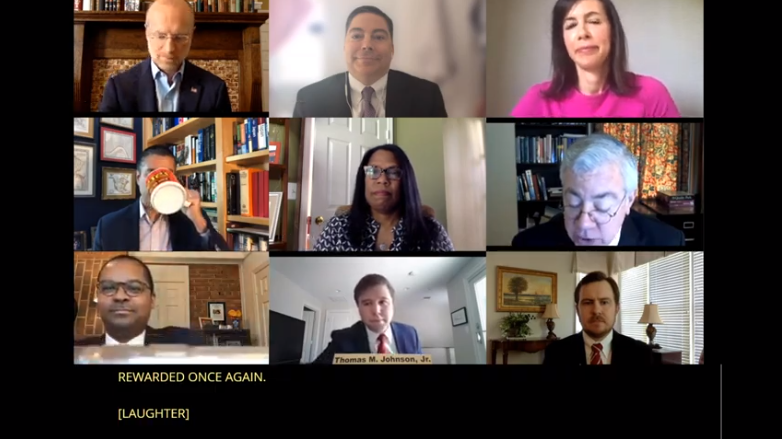FCC Clarifies 5G Buildout Streamlining Strategy
The smarter way to stay on top of the multichannel video marketplace. Sign up below.
You are now subscribed
Your newsletter sign-up was successful
A politically divided FCC voted to clarify some of the steps the commission has taken, championed by commissioner Brendan Carr, to speed tower upgrades, and other elements of 5G wireless network buildouts, particularly the co-location on existing large towers. That includes making it clear that tower aesthetic conditions can't be used to unreasonably delay buildouts.

Democrats argued the item should be delayed since localities are busy dealing with a pandemic, economic hit and civic unrest, rather than "ramrodded through," and dissented.
The item, a declaratory ruling, clarifies how the FCC is interpreting legislative language that says "a state or local government may not deny, and shall approve, any eligible facilities request for a modification of an existing wireless tower or base station that does not substantially change the physical dimensions of such tower or base station.”
The item:
1. Clarifies when the FCC's 60-day shot clock is triggered on localities' reviews of a wireless builder's documents and what constitutes a substantial change in certain circumstances. That is when the builder takes the first step required by a locality. Industry has to make written submissions before claiming the shot clock has started.
2. Clarifies what equipment can go on existing structures, and
3. Spells out distinctions between concealment elements--having to make a tower look like a tree or a flagpole or clock tower--and other conditions related to aesthetics, and clarifies that aesthetic conditions can't be enforced "in a way that negates our other rules that promote streamlined approval."
The smarter way to stay on top of the multichannel video marketplace. Sign up below.
FCC chair Ajit Pai said 5G was a top priority--the commission has a 5G Fast Plan--which means more spectrum, modernizing infrastructure, and speeding deployment.
He outlined the steps the FCC has done to free up spectrum--including the C-Band and other midband spectrum--by way of suggesting it has not been easy but the FCC has pushed on.
He said the item would clear up some confusion about regulations on upgrading equipment on existing structures. He said they would accelerate 5G by avoiding misunderstandings, roadblocks, and lawsuits.
he said he could not disagree more with delaying due to COVID-19. He said that has emphasized the need for speeding telehealth and precision agriculture. It is an iron law that you can't have broadband without infrastructure, he said. He also said that localities had not had time to review the proposal did not hold water, since the petitions were filed last fall. He said calling for delay trotting out the same old tactics.
Carr says the item will help separate tougher project approvals--when and where to build a new tower--from ones that can be more easily and quickly achieved--updating an existing large tower. The item is responsive to petitions from CTIA, the wireless industry association, and the Wireless Infrastructure Association, which asked for the clarifications.
At the meeting, Carr aired a video of him atop a tower in Maryland with a crew doing a co-location switch-out to 5G. He pointed out that using existing towers is cheaper and requires less regulatory reviews than building new ones.
Commissioner Michael O'Rielly said that the FCC's guidance is necessary to avoid disputes down the road and that while some have asked for delay, many of the clarifications are straightforward and can help localities with processing applications.
Commissioner Jessica Rosenworcel invoked the pandemic, including the high unemployment rate, as well as the protests over racial injustice, in casting her dissent.
She said what can be said with certainty is that state and local governments are dealing with a multitude of challenges, and with fewer resources thanks to social distancing hits on tax revenues.
She said the FCC decision shows that the FCC is not listening to those cities and towns, who must immediately review and update their wireless tower request processing. She said the clarifications were only shared with state and local governments three weeks ago.
Rosenworcel said the FCC has heard from more thousands of cities, towns and counties asking for more time to weigh in on the decision given the economic calamity and civic unrest.
She said the FCC has decided to "ignore" that request for extra time.
Commissioner Geoffrey Starks, said he was all for speeding 5G buildouts, but seconded Rosenworecel's concerns, saying the decision "imposes new obligations on local governments at the worst possible time," which means when they are dealing with a pandemic and demonstrations over racial inequality.
“Taken as a whole, rather than clarifying our policies and expediting approvals, the posture of this Declaratory Ruling is likely to lead to time-consuming and costly disputes about intent and reasonableness between local governments and industry; and furthermore, it is likely to lead to protracted litigation," he said in his dissent. "Moreover, because of the substantial burdens we place on local governments’ review of modifications to existing sites, those governments may even give greater scrutiny to initial siting requests, leading to additional frustration and delays.”
Contributing editor John Eggerton has been an editor and/or writer on media regulation, legislation and policy for over four decades, including covering the FCC, FTC, Congress, the major media trade associations, and the federal courts. In addition to Multichannel News and Broadcasting + Cable, his work has appeared in Radio World, TV Technology, TV Fax, This Week in Consumer Electronics, Variety and the Encyclopedia Britannica.

